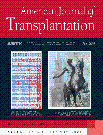Significance of Anticardiolipin Antibodies on Short- and Long-Term Allograft Survival and Function Following Kidney Transplantation
Antiphospholipid antibodies (APA) are directed against phospholipids or plasma proteins bound to anionic phospholipids. Anticardiolipin antibodies (ACA) are a sub-set targeted against cardiolipin, or phosphatidylserine bound to proteins such as β2-glycoprotein I or prothrombin. The combination of demonstrable APA/ACA with the clinical manifestation of venous and arterial thrombosis, recurrent fetal losses, neurologic events and thrombocytopenia is referred to as the antiphospholipid antibody syndrome (APAS) that may be either primary or secondary to SLE or hepatitis C.
In the setting of transplantation, such antibodies have been associated with renal arterial and venous thrombosis, thrombotic microangiopathy and hepatic artery thrombosis. Antiphospholipid antibodies are found more frequently in patients with ESRD than the general population. In one study of 502 patients awaiting renal transplants, 19% had high titers of ACA (1). Twenty-three patients had documented evidence of one or more of the thrombotic disorders, and thus were diagnosed with APAS. Eleven of the latter were transplanted, of whom four were anticoagulated and seven were not. All seven of the patients with APAS not treated with anticoagulation therapy lost their allografts within 1 week as a result of thrombosis. In contrast, three of four transplant patients with APAS treated with anticoagulation therapy maintained their allografts for over 2 years. Of the remaining 70 patients with high titers of ACA but no evidence of thrombotic disorders, 37 received kidney transplants. None lost their allografts as a result of thrombosis. Another report outlined the hazard of ACA when found in conjunction with hepatitis C virus (HCV) infection post-transplantation (2). All of five HCV (+) patients who developed thrombotic microangiopathy had evidence of ACA. In contrast, only 1/13 HCV (+) patients without thrombotic microangiopathy had a positive anticardiolipin antibody. Wagenknecht et al. reported that APA were present significantly more often in patients with primary non-function (57%) as compared with 35% of the patients with functioning grafts (3). Finally, in a study of 324 consecutive renal transplant recipients, multivariate analysis indicated that APA is an independent cardiovascular risk factor in renal transplant recipients (4).
One of the uncommon, although frequently devastating, complications of transplantation is the development of graft venous or arterial thrombosis. While potentially salvageable, such events remain a common cause of primary non-function or premature graft failure. It is clear from the above review of the literature that a sub-group of patients exists that is at very high risk of developing thrombotic complications post-transplantation. Consequently, many transplant programs test for APA/ACA as part of the routine pre-transplant evaluation screening and anticoagulate those with positive results. In a recent publication, Vaidya et al. examined the efficacy of anticoagulation therapy in this high-risk patient population with APAS (5). Of nine APAS-positive renal-transplant patients, seven were treated with warfarin and two were treated with heparin. Of the two heparin-treated patients, one had early allograft loss, whereas the other patient is doing well 5 years post-transplant. Of the seven warfarin-treated patients, two did well, two had early allograft loss and the remaining three patients returned to dialysis after discontinuation of warfarin because of bleeding complications.
In this edition of the American Journal of Transplantation, Forman et al. provide an observational analysis of the impact of ACA on the outcome of 337 transplant recipients. In their cohort, ACA were found in 18% of patients. No difference in outcome was noted between the two groups. Although significantly more patients with ACA received anticoagulation than those who did not have ACA (22% vs. 7%), the majority of patients with ACA were not anticoagulated. One hypothesis that could explain the lack of difference in outcomes is that thromboses were prevented in the ACA group by the anticoagulation provided. The authors did comment that the incidence of graft loss was very high in patients with high titer ACA at 40% in the absence of anticoagulation.
The key question is whether all patients with demonstrable ACA benefit from anticoagulation. It seems that some individuals are at extremely high risk:
- •
Documented antiphospholipid syndrome
- •
Hepatitis C combined with ACA (?)
- •
High titer ACA (?)
Clinical prudence suggests that such individuals should be anticoagulated. However, the current study, as well as that of Vaidya et al. (1) suggests that anticoagulation may not be necessary for all (low-risk) ACA-positive individuals unless they have a history of thrombosis. The only way to definitively address the question will be a prospective trial in which ACA positive individuals are randomized to receive anticoagulation or not. Such a study should elucidate the risks and benefits of post-transplant anticoagulation, a therapy that is known to be associated with a significant morbidity and small mortality, both in the early peri-operative period as well as long-term.




